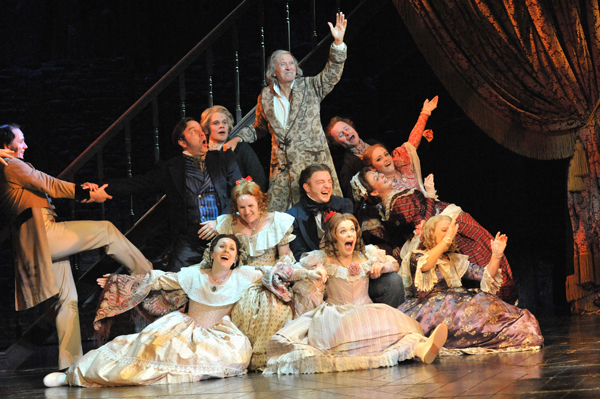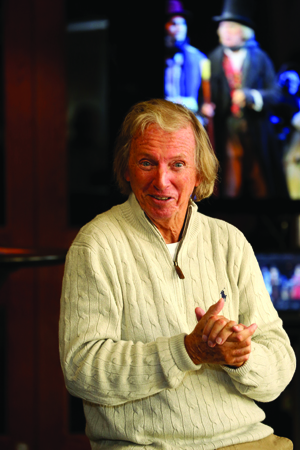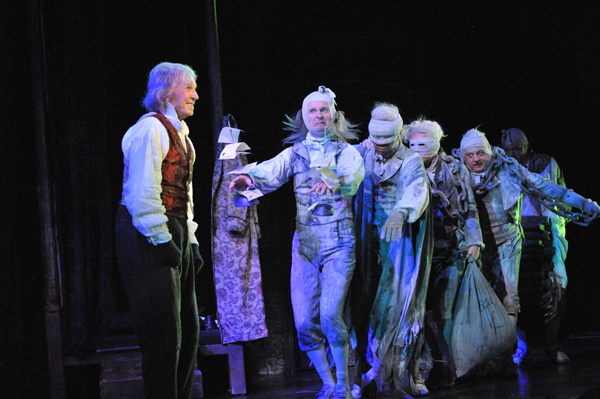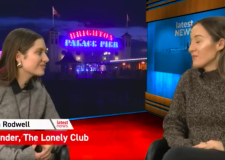Tommy Steele interview

He’s Ebenezer
In a career spanning nearly 50 years, Tommy Steele has been dubbed Britain’s answer to Elvis, having conquered the West End and Hollywood movies. Andrew Kay talks to him about the musical Scrooge and discovers there’s no stopping this song and dance man.
What is it that drives you to carry on working so hard?
“If I’m lucky enough to get hold of a good show I never let go of it. Right from Half A Sixpence, Hans Christian Andersen, Singing In The Rain, all these great shows that I have been given I’ve played for at least three or four years, Scrooge for ten years. When you’re lucky to have a show that runs to packed theatres with audiences that love it, that’s what I’m in the business for, that’s why I do it. I love entertaining people, and, if producers keep giving me things to do, then I’m not going to stop. When producers stop calling and it’s all quiet on the Western Front I start panicking.”
But you fill your life with other things; you paint and sculpt…
“It’s all one, it’s all entertaining. I do a sculpture because I want you to go ‘oh, that’s nice’.”
If I said Liverpool Empire 1959, what would you say?
“Bloody hell, were you there?”

I was, Humpty Dumpty and my first experience of theatre aged three.
God, the worst show I ever did in my life. I went to the Palladium to see Harry Secombe do it when it first opened. At the beginning the egg fell off the castle wall and cracked open and out came Harry Secombe. The following year I was asked by Val Parnell if I would do it in Liverpool and I thought it was a great opportunity. When I got to Liverpool nobody knew how the mechanism for the falling egg worked and the guy who created it had left. So I said I can’t do this show unless Humpty Dumpty falls off and climbs out of the smashed egg. They said ‘Can’t you just walk on the stage?’ and I said no, I’m only doing the bloody show to come out of the egg. I ended up doing 12 weeks hating the opening because I just had to walk on. It was in Liverpool, in the fourth week that Harold Fielding called me about a new show.
He wanted me to hear it and said that If I liked it he would produce it. That meant them coming up to Liverpool and meeting me after I did the two daily shows. So they came up – the composer David Heneker and writer Beverley Cross and Maggie Smith to read the girl part, she was such a beautiful woman. And that was Half A Sixpence. That was the first time I heard it, in Liverpool, actually in The Cavern Club as it was the only place we could find that had a piano we could use. I agreed there and then to do it.”
You made a massive leap from rock ’n’ roll pop star to being a stage actor, and you never went back…
“You know why? In 1957 I was riding high as a rock star with a big hit record. Someone said you must do a panto because everybody in show business did a panto. I’d seen enough pantos and I said alright. I did Goldilocks And The Three Bears at The Royal Court in Liverpool. I walked into the rehearsal and the director said, ‘Let me tell you what’s going to happen here’. I’d never been talked to like that before. He pointed at me and said, ‘We start with a dance number in the opening scene, then a comedy routine with the dames, then a love scene with the princess’, and he poked my guitar and said, ‘and you wont need that.’ I started to work with the choreographer and the musical director to sing the ballad and the comics for the laughs and suddenly I realised that a panto was a musical and although I was only 20 after two months in the show, singing, dancing and acting, I thought, you know this is what I want to do for the rest of my life. I loved the challenge, acting, singing and dancing a scene.

Two years later I was flown to New York to meet Rodgers and Hammerstein, I mean it’s crazy, isn’t it? I arrived in Madison Avenue and this giant of a man was waiting in the rain for me and the first thing he said was, ‘You’re late, come on’. We got in the lift and he asked me which was most important in a song, the lyrics or the music. I ummed and aahed but before I could answer he said, ‘It’s the lyrics because that’s the only reason for singing the song in the first place, the lyrics are the story’. The lift stopped and he showed me to a door that said Richard Rodgers. I went in and before the door shut he said, ‘Let me ask you a question, which is more important the music or the lyrics?’
I said the lyrics and he said, ‘Oh Oscar got to you first, then’.”
How did you get to do Scrooge?
“It was ten years ago and Bill Kenwright, the producer, who I’d never worked with, called me and asked if I would come to lunch. Now when a producer asks you to lunch you know they’re fishing. So we had lunch and finished eating and he said, ‘How do you feel about doing a new musical based on A Christmas Carol?’. I said I couldn’t do that, I’m too old to play Bob Cratchett. And he said, ‘You’re not playing Bob Cratchett, you’re playing Scrooge’. I said are you out of your mind, that old bastard…? And then I thought, hang on, I’m 66 myself, of course I can play Scrooge. It’s the song and dance man’s King Lear and you can have a lot of fun with it.”
You’ve played a lot of light roles but this is Dickens and quite dark…
“I play him naughty rather than sadistic, he’s had disappointments but he’s not wicked.”
Is it hard work to go back to a show?
“Yes, because it’s a new company and a new audience too. I suppose because the company know that I know the show, they relax, but they have to find their own way to play their roles and I have to learn to work with them in that way.”
Is it all up there in your head?
“Yes, but I still rehearse with the book to put the cast at ease.”
That’s a generous way of working…
“I like to be a part of a team and it’s wonderful when they see that they have some freedom in the way they play the role. It keeps it exciting for me too. There’s one difficult part for the nephew a tough role for a young actor, probably a first feature role, and they have to sing a duet with me. I always let them sing it through and when we finish I leave a moment and I say ,‘Is that the way you’re going to sing it?’ and wait for their reaction. Naughty.”
Not unlike your Ebenezer…
“Exactly!”
What makes Scrooge special for audiences?
“Firstly, the sound of the orchestra, it is wonderful. Then the set appears and that is London Cheapside and it’s breathtaking and everything happens within the confines of that set which is why so much money has been lavished on it. Then the company start to appear on the set and they just keep on coming, it’s a huge cast, adults and children. Then they start to sing and the audience hear this wonderful choral sound. Then you get the story, one of the best things Dickens ever wrote. Then the ghosts appear. Every time a ghost appears the show goes up another level and another 20 decibels. It’s magical, all those ingredients plus a great score. It’s a lovely show, that’s why I keep doing it and that’s why I’ll keep on doing it – as long as they keep asking me.”
Scrooge, The Brighton Centre,
23 December 2013 – 4 January 2014. Box Office: 0844 847 1515 www.brightoncentre.co.uk





















